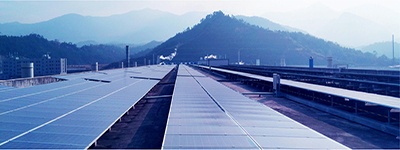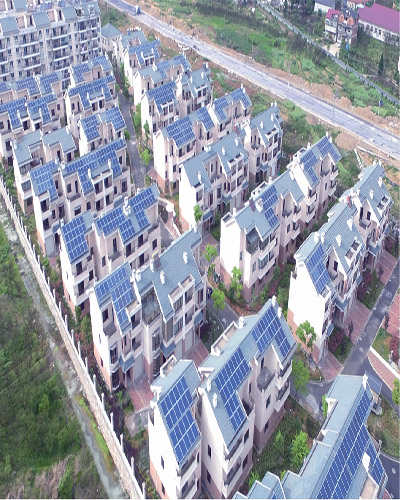FOTOVO 2MPPT design solar power microinverter
Product Details

Solar System Wiring Diagram

How to Apply Microinverter in an AC-Coupled Solar Battery System?
 |
① AC-coupled solar battery system as shown , is the connection of a battery energy storage system to a solar system via AC (alternating current) electricity. ② Energy from a solar system is generated in the form of DC (direct current) electricity which is then turned into AC by the solar microinverters. ③ A battery bi-directional / multimode inverter connected to the same electrical network via AC then converts any spare energy not used by the home back into DC so it can be stored in a battery.
|
The AC-coupled solar battery system is more complicated than the traditional grid-tied PV inverter system. But this kind of system can even work when grid outage or the system is the type of off grid.
For now, more and more manufacturers have launched AC-coupled solar battery system. Some of these solutions are integrated PV inverters, which others require the installers to select the grid-tied PV inverters to integrate with their battery system.
Technical Parameter
| Model | GSM600W | GSM700W | GSM800W |
| Input Data(DC) | |||
| Commonly used module power(W) |
240-380 |
280-440 | 320-500 |
| Module cmpatibility |
60 cells or 72 cells PV modules |
60 cells or 72 cells PV modules |
60 cells or 72 cells PV modules |
| Peak power MPPT voltage range(V) |
29-48 |
33-48 | 34-48 |
| Start-up voltage(V) |
22 |
22 | 22 |
| Operating voltage range(V) |
16-60 |
16-60 | 16-60 |
| Maximum input voltage(V) | 60 | 60 | 60 |
| Maximum input current(V) |
2*11.5 |
2*11.5 |
2*11.5 |
| Output Data(AC) | |||
| Rated output power(W) | 600 | 700 | 800 |
| Rated output current(A) | 2.73/2.61/2.5 | 3.18/3.04/2.92 | 3.64/3.48/3.33 |
| Nominal output voltage(A) | 220/230/240 | 220/230/240 | 220/230/240 |
|
Nominal output voltage range(V) |
180-275 |
180-275 |
180-275 |
| Nominal frequency/range(Hz) | 60/55-65 |
60/55-65 |
60/55-65 |
| Power factor | >0.99 | >0.99 | >0.99 |
| Total harmonic distortion | <3% | <3% | <3% |
| Maximum units per branch | 8/8/8 | 7/7/7 | 6/6/6 |
| Efficiency | |||
| CEC peak efficiency | 96.7% | 96.7% |
96.7% |
| CEC weighted efficiency | 96.5% |
96.5% |
96.5% |
| Nominal MPPT efficiency | 99.8% |
99.8% |
99.8% |
| Nighttime power consumption(mW) | <50 |
<50 |
<50 |
| Mechanical Data | |||
| Ambient temerature range (℃) | -40~+65 | ||
| Dimensions (WxHxD mm) | 250x170x28 | ||
| Weight (KG) | 3.0(including 2.32m AC cable) | ||
| Enclosure rating | Outdoor-IP67 | ||
| Cooling | Natural convection-No fans | ||
| Features | |||
| Communication |
2. 4GHz Proprietary RF(Nordic) |
||
| Monitoring | Monitoring system | ||
| Warranty | Up to 25 years | ||
| Compliance |
UL1741,IEEE1547, CSA C22.2 No. 107.1-16,NOM-001-SCFI-1993, FCC Part15, ANSI C63.4, ICES-003, ABNT NBR 16149: 2013,ABNT NBR 16150: 2013,Anatel |
||
1.Safer:The solar panels are connected in parallel, and the system has no DC high voltage.
2.No cask effect, more power generation:The solar panels are independent from each other, without cask effect,
and the actual system efficiency can be maximized.
3.Wide range of application:A good solution to the multi-orientation, shaded roof system; Surrounding environment dust, flying flocculant more complex scene.
4.Simple system:The combination of PV moduels and micro inverter is modular, which simplifies design and construction and reduces system cost.
5.Flexible system design:Allow the design and connection of solar panels which has different powers, brands and types in the same system.
6.Smart monitoring:PV module-level monitoring to reduce later operation、maintenance and repair costs.
7.Long service life:The service life of the micro-inverter is up to 25 years, and the comprehensive investment cost is lower than the traditional system, and the cost performance is higher.
Package




Factory

 |
 |
 |
|
 |
 |
 X
X